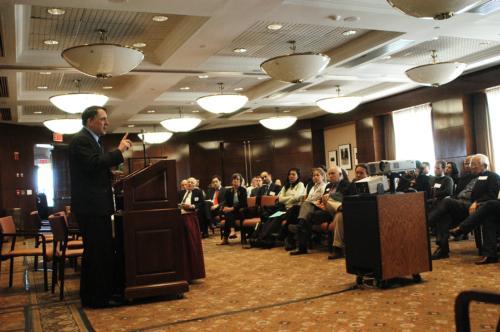
News
Cambridge Residents Slam Council Proposal to Delay Bike Lane Construction

News
‘Gender-Affirming Slay Fest’: Harvard College QSA Hosts Annual Queer Prom

News
‘Not Being Nerds’: Harvard Students Dance to Tinashe at Yardfest

News
Wrongful Death Trial Against CAMHS Employee Over 2015 Student Suicide To Begin Tuesday

News
Cornel West, Harvard Affiliates Call for University to Divest from ‘Israeli Apartheid’ at Rally
Ambassador Predicts a Fate for Iraq

Ambassador Peter W. Galbraith ’73 predicted that Iraq would not be able to weather the ongoing civil war and would eventually split along sectarian lines in a speech before an audience of sympathetic Fulbright alumni at the Kennedy School of Government on Saturday.
Though the event on Saturday was a gathering of Fulbright alumni and current scholars, Galbraith—who was never a member of the Fulbright program—was invited because of his support for the program during his 14 years as a senior advisor to the Senate Foreign Relations Committee.
“The Iraq war has not served a single national security purpose,” Galbraith said. “Iraq cannot be put back together again—there is actually no way to stop the civil war in Baghdad.”
Despite the fact that most of the assembled scholars strongly backed Galbraith’s comments, one Iraqi woman took issue with his prediction that Iraq would fracture along ethnic lines.
She said that the fault for Iraq’s divisions lies with politicians who are dividing people for their own ends, and that the populace is less divided than Galbraith claimed.
“We are all Iraqi,” she added.
But an Iraqi Kurd said that he supports autonomy from the Baghdad government for the Kurd-controlled region in the north.
“I am not hating Iraq,” he said, adding that he agreed with most of what Galbraith said about the state of Iraq.
The event, which was the first of its kind, brought together Fulbright alumni and students and scholars from the Boston area to discuss topics such as international conflict, development, contemporary Islam, energy, and global warming.
“Our main goal was just to get the very different parts of the Fulbright community together,” said event organizer Shoba Ramanadhan, a Fulbright alum and PhD student at the Harvard School of Public Health.
The Fulbright program supports both American students studying and researching abroad, as well foreigners studying or researching in the U.S. The program, named after former Arkansas Senator J. William Fulbright, is funded by the State Department.
Carlos Olimpo Mendivil Anaya, a Colombian, said that the Fulbright program would allow him to learn technical skills that he would use for the benefit of his home country.
“I am very excited about coming back and [making] some contribution to the country,” said Anaya, who studies diabetes at the Harvard School of Public Health.
He added that when he returns, he hopes “to start world class research groups in Colombia.”
Want to keep up with breaking news? Subscribe to our email newsletter.
